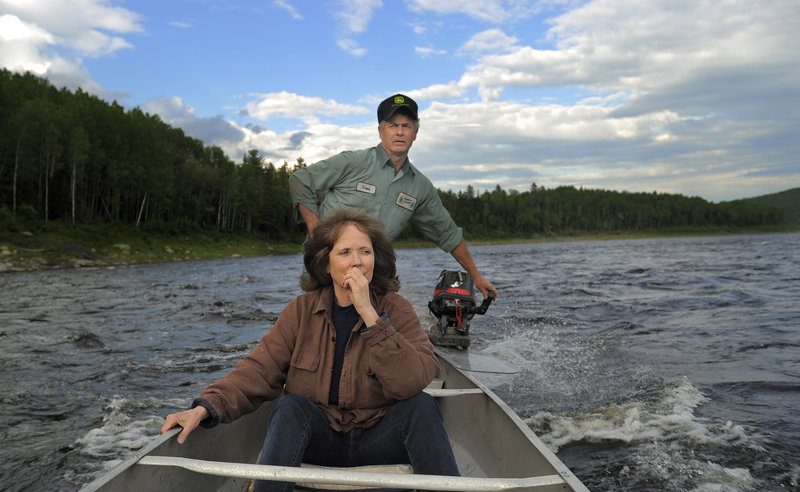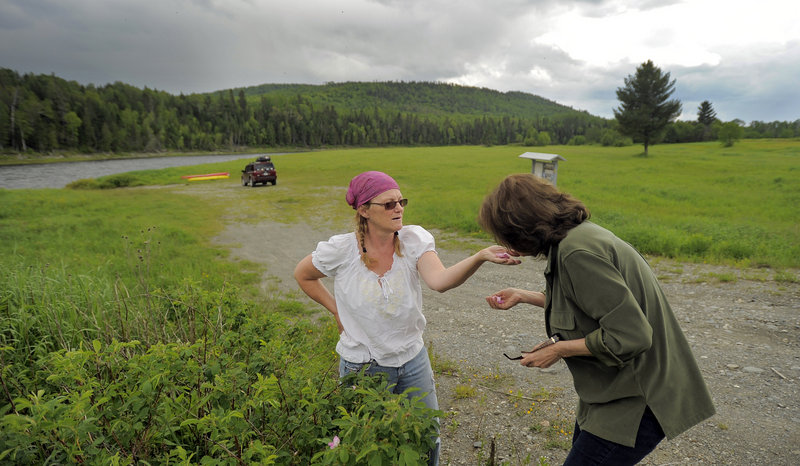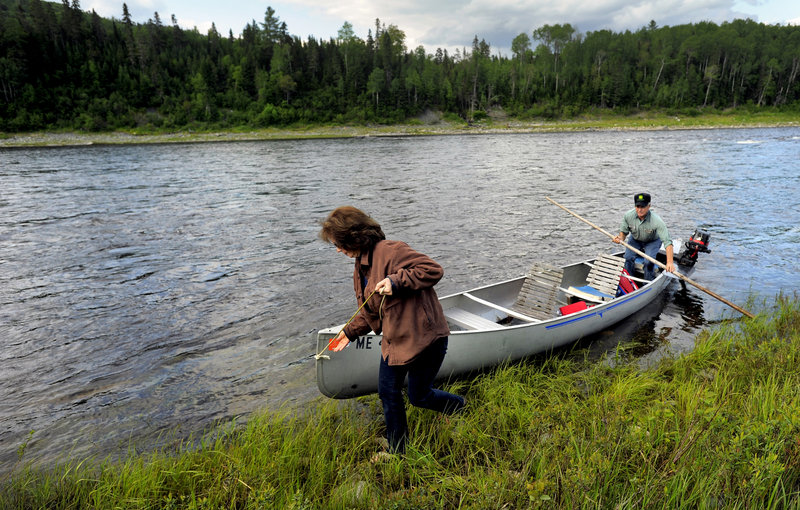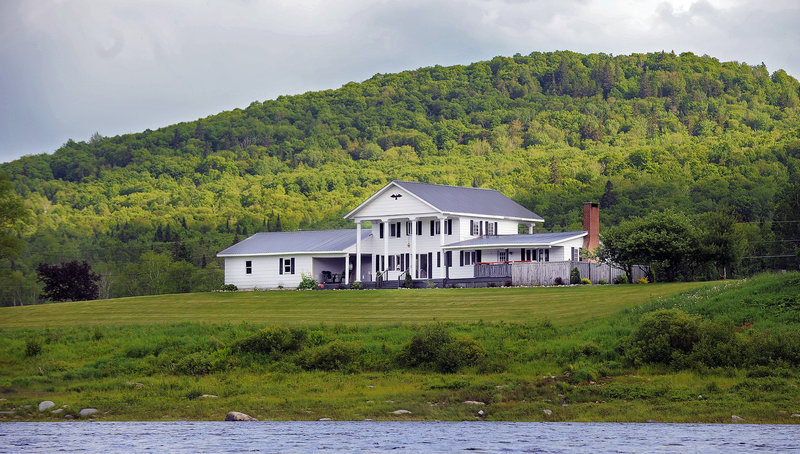ALLAGASH — Cathie Pelletier’s invitation to a downstate visitor comes with a warning: “I just came in from picking wild violets on the mountain. I should remind you: The state bird up here is the BLACKFLY.”
Welcome to the north Maine wilderness, where author, humorist and all-around rusticator Cathie Pelletier has come home.
A best-selling author and modestly successful songwriter, Pelletier, 60, has returned to the banks of the St. John River at the very top of northern Maine. The last paved road in the state ends a few miles from her house.
Otherwise, it’s all woods and water.
And black flies.
After spending most of her life in the South, Pelletier returned to Allagash four years ago with her husband to care for her elderly father, a lifelong lumberjack who, at 93, remains quite lively.
Her latest novel, “The One-Way Bridge,” brings readers back to fictional Mattagash, the last town in the middle of northern Maine where a single-lane bridge divides and unites the folks who live there.
With its quirky people, petty feuds and acts of everyday heroism, “The One-Way Bridge” is not-so-loosely based on Allagash. Pelletier got the idea for the book in the 1991, when she saw a national news broadcast of Allagash’s one-way bridge washing out in high water.
The state replaced the bridge with a modern two-laner, and one way or another, Pelletier has been writing the story ever since.
This is her fifth Mattagash novel, and the first since 2005’s “Running the Bulls.” The first was “The Funeral Makers” in 1986.
It doesn’t matter that she began the book in Nashville and wrote much of it while living briefly in Canada. This is a Maine book to the core.
“Eudora Welty said, ‘We write out of the first 10 years of our lives,’ and I think that’s true,” Pelletier said, seated on the deck of the house her father built, a sprawling place with big columns snug between the road and the river. “I’m back in the house that I was born in and the house my mother died in.”
Pelletier came home for another reason: This is where her soul lives, and where she hopes and expects it will live forevermore.
“If I have a choice of where to die, I’d like to die here too,” she said.
It seems that this time, she’ll stay.
Pelletier left Allagash at age 16 for college just up the road in Fort Kent. But college didn’t suit her. The University of Maine at Fort Kent booted her for reasons of discipline that she’d rather not discuss.
Restless and bored, she hitchhiked 10,000 miles across 43 states, came home three months later and eventually finished college.
SOUTH AND BACK AGAIN
In a family that boasts seven generations of loggers, Pelletier was a first-generation writer. She left the woods and rivers, moved to Nashville and took up with a country singer.
Along the way, she became one of America’s most-loved and best-read authors while also enjoying a modestly successful career as a songwriter. The Texas Tornados had a minor hit with “Who Were You Thinkin’ Of?” in 1990; The Glaser Brothers recorded her “Happy Hour Blues.”
Pelletier lived in Tennessee for 30 years, much longer than she’s lived anywhere. After spending a few years in Canada, she and her husband, Tom Viorikic, settled in Allagash four years ago.
“In the writer’s world, they say you can never go home,” Viorikic said. “But she did. It was the right move. Now it’s going to be hard to get her away from here.”
Pelletier is much acclaimed. Her third novel, “The Weight of Winter” (1991), won the New England Booksellers Award. “Running the Bulls” won the Paterson Prize for Fiction. She’s received million-dollar advances, and has been profiled in People magazine.
When it was released in May, “The One-Way Bridge” quickly became the top-selling fiction book at Longfellow Books in Portland.
The novel brings the Mattagash story into the current era. When Pelletier began writing this series, it was set in 1959; the new book takes place in 2006.
Much has changed, yet much is the same. As in the case of real-life Allagash, the cell phone service in Mattagash is spotty, but the logging trucks still rumble down the road in the middle of the night. It’s easier to get to Fort Kent, but it’s still seven hours to Portland.
And in her story, there’s still a one-way bridge, which ties the town in knots and brings it to a standstill in a show of will between two longtime adversaries, a retiring mailman and a Vietnam veteran. They end up nose to nose in their vehicles in the middle of the span, neither willing to budge for the other, a lifetime of misunderstandings and disagreements between them.
Although Pelletier “does not consider myself back yet,” she seems very at ease in Allagash, which claims about 200 residents. She is surrounded by family, and keeps a low profile in town. She describes herself as a bit of a hermit, and sometimes wishes that her father had planted trees in the front yard to provide more privacy.
But she is very much at home.
On a tour of the town, Pelletier points out all the local landmarks, which are few. The “Welcome to Allagash” sign, the former school, the confluence of the Allagash and St. John rivers. She marvels at the wild roses and lupines, and pays curious attention to the American flags that hang throughout town.
‘SHE’S ONE OF US’
Pelletier has reconnected with old friends, who delight in having “our own little celebrity” back in town. “But it’s not really like that,” says Darlene Kelly Dumond, a childhood friend. “She’s one of us. She’s Allagash. There’s nothing fake about her.”
Like Pelletier, Dumond also came home to Allagash. She left when she was young, settling in southern Maine. She came home in 2005, and helps out at the local cafe.
“It says something about our community that those of us who have gone away have found our way back,” Dumond said. “Those of us who do find our way back are lucky.”
Dumond reconnected with Pelletier when, while sunning on a York County beach, she began reading one of the author’s earlier Mattagash novels and recognized the characters. “I know all these people,” she remembers thinking.
Pelletier has been busy. She filled her spring and summer with books tours, drawing capacity crowds to publicity events in Nashville and to a reading in Portland. In August, the paperback edition of “The One-Way Bridge” will be available.
She will release two new books next year: A middle-school reader tentatively titled “Aliens in Allagash,” and a novel, “A Year After Henry,” set in another fictional Maine town, Bixley, that has no connection to Allagash whatsoever.
“I don’t know where it is,” she said with a laugh. “It’s somewhere in Maine.”
Pelletier would not be the writer she is if not for Allagash. Growing up in a remote place like this, so far from everything, helps sharpen one’s imagination, she said.
In the ’50s and ’60s, the surest way out of town was a logging truck or the river. The river has sustained generations on both sides of her parental lineage, and remains the ribbon of soul that defines the community geographically and culturally. The deep-woods lumber industry still supports the livelihood of many in her family and in this town.
She is fascinated by the draw of northern Maine, and can’t quite explain it.
“Something I have noticed — and booksellers tell me the same — even in Connecticut and New Hampshire, they have never seen before how people come to buy a book and meet me because I’m from northern Maine,” she said. “Imagine someone saying, ‘I wanted to meet you because I’m also from northern Maine.’ Or they tell me their father, mother or even grandparents are from Caribou, or Madawaska or Fort Fairfield.
“They feel a connection. We are a different planet. We should be a separate state.”
Staff Writer Bob Keyes can be contacted at 791-6457 or:
bkeyes@pressherald.com
Twitter: pphbkeyes
Send questions/comments to the editors.









Success. Please wait for the page to reload. If the page does not reload within 5 seconds, please refresh the page.
Enter your email and password to access comments.
Hi, to comment on stories you must . This profile is in addition to your subscription and website login.
Already have a commenting profile? .
Invalid username/password.
Please check your email to confirm and complete your registration.
Only subscribers are eligible to post comments. Please subscribe or login first for digital access. Here’s why.
Use the form below to reset your password. When you've submitted your account email, we will send an email with a reset code.